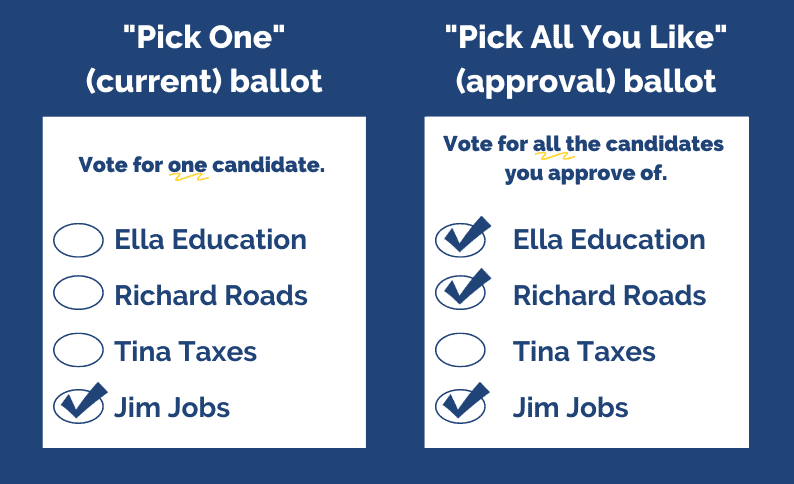
What’s the best way for a department to make hiring (or other contentious but important) decisions? Some take a simple vote between the final-stage candidates, perhaps followed by a run-off between the top two. Others, I hear, just discuss until they reach a unanimous verdict. I’d be interested to hear about yet other approaches. One that sounds promising to me is a kind of weighted approval voting that I’ll outline below. But if there are reasons to think it would be a bad idea, I hope you’ll share them in the comments!
Simple Approval Voting
On simple approval voting, each voter may vote for as many candidates as they please. The candidate with the most support wins. This system is very simple, and has the virtue of tending towards moderation and consensus (which strikes me as especially valuable within a small-group context like an academic department, where you really don’t want factions developing).

The downside is that it is very coarse-grained: the vote / no vote binary fails to reflect finer distinctions between voter preferences, which can predictably lead to suboptimal results.
Weighted Approval Voting
[Update: it turns out that the official name for this is range voting.]
Here the idea is that voting is no longer all-or-nothing. Instead, voters may contribute any fraction of a vote (from 0 - 1, inclusive) to each candidate. You’ll presumably always want to give ‘1’ to your top choice. But your second-top choice (and so on) could be given 1, 0.9, 0, or anything in-between, depending on how you feel about them in comparison to the other candidates.
This allows voters the option to report finer-grained preferences, while sharing the consensus-building virtues of approval voting. (A candidate who receives 0.9 from everyone in the department can—and should!—beat a polarizing rival who scores 1.0 from a bare majority and 0 from everyone else.)
Of course, counter-majoritarian virtues can never be guaranteed in practice. A strategic majority could choose to vote 1 for their top choice only, and 0 for everyone else (including rival candidates that they actually believe are fairly good). So strategic voting could, at the limit, collapse this back into simple majoritarianism. But it will at least sometimes do better, so I think that’s a good reason to prefer it.
(Non-binary voting is probably too complex for the general electorate. But academics should be able to handle it.)
Ranked Choice / Run-off Voting
This more standard approach seems broadly okay. But I do think it’s a disadvantage that the system does nothing to especially support consensus candidates. Anyone who is the top choice of a bare majority is guaranteed to win, and that strikes me as a bad feature (at least in a departmental context).
Unanimity
I can see the appeal of the “just talk it out until everyone agrees” approach, but it might require an unusually collegial departmental culture to work well. One can imagine it breaking down dramatically in the face of a stubborn hold-out, for example. Even putting aside outright dysfunction, this method risks giving excessive weight to the preferences of more assertive personalities over more agreeable and conciliatory colleagues.
I’d also think that all the reasons to value secret ballots are reasons to not make important decisions purely via open discussion. (Junior faculty might be hesitant to voice disagreement with senior colleagues, for example.) So I tend to think that it’s worth adopting some sort of voting process. But I’d be curious to hear the opinions of those with first-hand experience of the unanimity approach.
Other options?
If you can think of an even better alternative, please share it in the comments!















We do a mix of all of these. We do a bunch of discussing, and if it looks like there might be a consensus, that's great and we do with that.
But then when we get to voting, in addition to voting for top choices, we vote "above the line" vs "below the line". Where, roughly above the line means you think they should get an offer either first, or when other people ahead of them turn offers down. "Below the line" means you'd rather not make them an offer, even if others have turned offers down (basically, you'd prefer the search to fail to making an offer to the candidate). But then we'll often do further rounds of discussion after learning opinions about the line.
Have you looked at "storable votes"?
https://en.wikipedia.org/wiki/Storable_votes